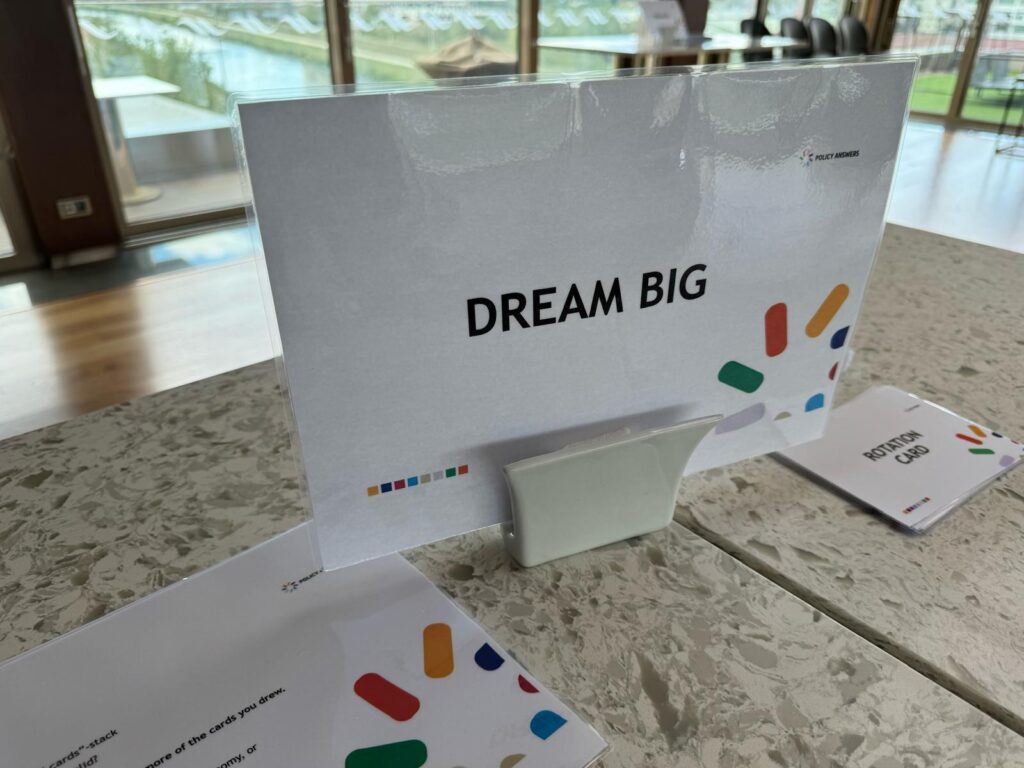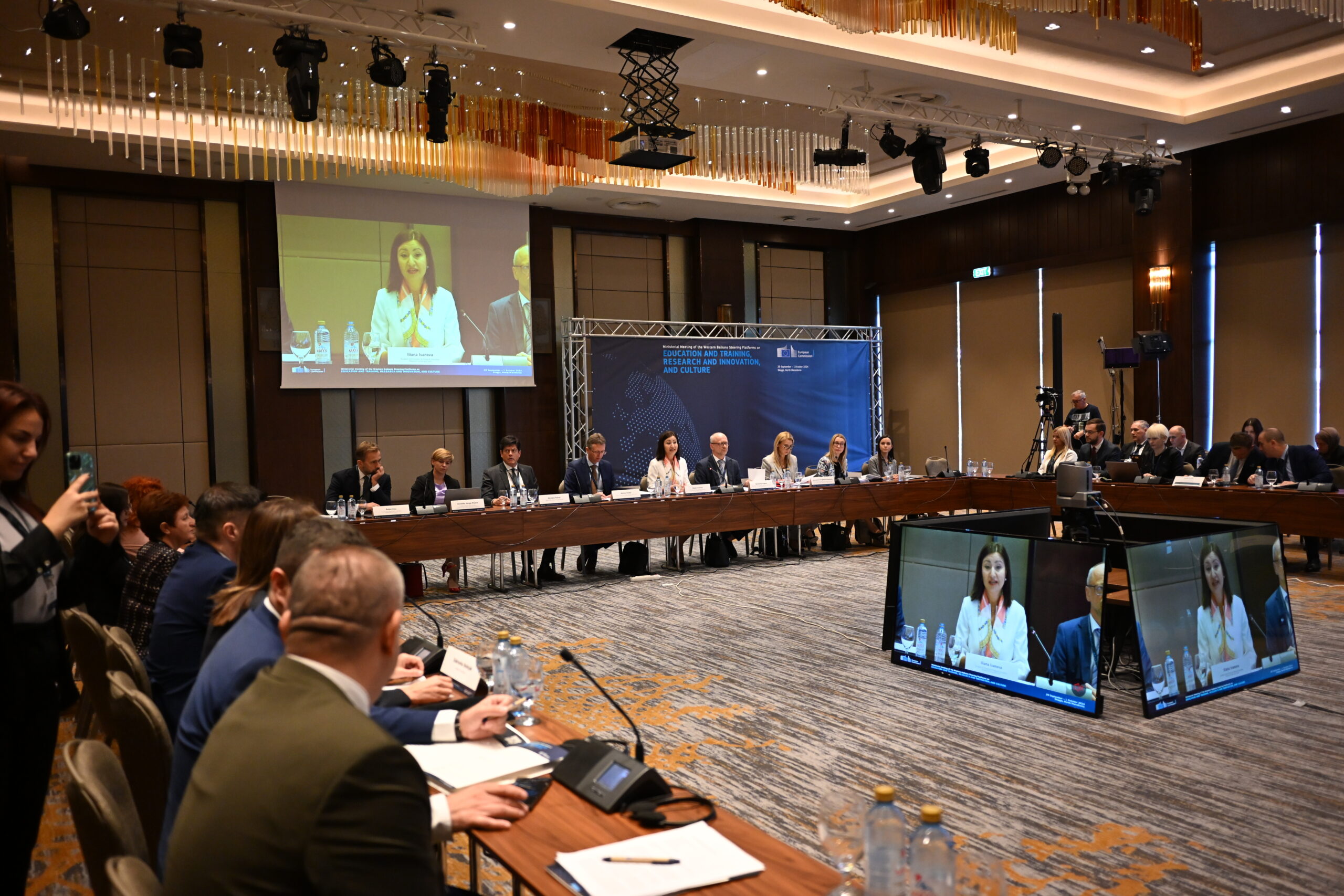POLICY ANSWERS, the organisation responsible for running the Western Balkans Info Hub and serving as the Secretariat of the Steering Platforms, played a central role in the series of events held from September 29 to October 1, 2024, in Skopje, North Macedonia. Led by ZSI – Centre for Social Innovation, the project’s “Policy Dialogue” work package provided logistical and administrative support for the Ministerial Round Tables focused on Research & Innovation, Education & Training, Smart Specialisation, and Culture.
Another highlight of the programme was a Foresight workshop, part of the project’s initiative to promote future-oriented thinking in the region. This interactive session enabled participants to engage in discussions on global and regional trends. Consortium partners, the Austrian coordinator ZSI, along with representatives from North Macedonia (MIR and FITD), Germany (DLR), and Albania (NASRI), actively supported the events, which featured the participation of 14 ministers from the region.
The event offered valuable insights for POLICY ANSWERS, informing on its ongoing efforts in analysis, monitoring, and capacity building, with a particular emphasis on research, innovation, and implementing the Western Balkans Agenda. On October 1, the event’s second day, discussions continued with two sessions focused on digital education and innovation ecosystems, further deepening these critical subjects.
POLICY ANSWERS coordinator highlights below some key takeaways from the event.
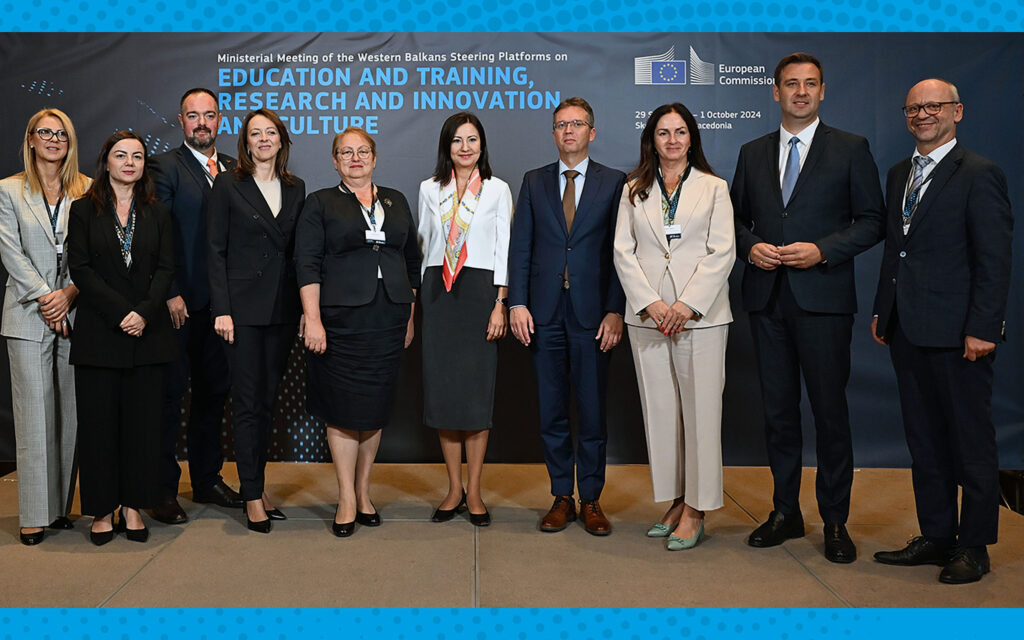
Education and Training
The digital transformation in education and training has brought to the forefront the need for equity and access, with particular focus on addressing challenges related to artificial intelligence, data protection, and digital wellbeing. These issues must be tackled collectively. As part of the EU’s commitment to building a skilled, inclusive, and competitive digital Europe, several promising initiatives and best practices were highlighted by the European Commission. The Western Balkans are already actively participating in 14 European University Alliances, and the College of Europe has established premises in Tirana, Albania. Additionally, participation in European Institute for Innovation and Technology (EIT) initiatives is on the rise, and organisations, respectively programmes, like ETF, EIT and MSCA are encouraging further engagement in skills development. Western Balkans economies are also associated with the Digital Europe programme, and teaching guidelines have been translated into local languages.
Prominent initiatives include assessments such as PISA, programmes like Girls Go Circular, and tools such as the Digital Education Hackathon and the SELFIE tool. The Community of Practice platform is also helping to share best practices. These efforts are linked to the EU’s Digital Education Action Plan, which is currently at its mid-term, with a consultation open for public feedback, and are tied to the broader European Education Area and the Innovation Agenda.
Regional collaboration has led to several Memoranda of Understanding (MoUs) and the mutual recognition of qualifications. A stronger connection between education and the business sector is essential to ensure curricula remain relevant to the labour market. This includes timely introduction of new subjects and tools to equip young people for future challenges. Addressing the concerns of established institutions, training teachers, and overcoming ongoing challenges are also critical.
Industry advisory boards and coordination councils can play a key role, as well as initiatives like internships, dual education, and dedicated support for entrepreneurship and start-ups. These measures help improve human capital and reduce brain drain. International cooperation through programs like Erasmus+, Horizon Europe, and various European degree programmes offers further opportunities.
Digitalisation is also essential for managing education systems. Current research information systems are helping manage data, while education in coding, digital literacy, and AI is starting at the primary level. Schools in the region are increasingly equipped with smart labs, online learning tools, and virtual and augmented reality. The Western Balkans are committed to leveraging AI’s potential while recognizing its challenges. Several economies are developing or implementing national AI strategies, setting ethical standards, and reinforcing legal frameworks for digital services and e-signatures. Digital Innovation Hubs and internet safety centres are being established to support these efforts.
Broadband access is high across the region, and the ‘WiFi for the Western Balkans’ initiative aims to extend connectivity to remote municipalities. Implementing the Digital Action Plan requires a multi-stakeholder approach and targeted reforms. The exchange of good practices to support teachers and students in the digital era remains vital. Investments in education and students are seen as investments in the future.
Ongoing cooperation with the EU, bilateral talks with Member States, and the contributions of stakeholders like the European Training Foundation, UNICEF, the Western Balkans Alumni Association, and USAID-funded projects are driving efforts to modernize curricula, enhance teacher training, promote life-long learning, and support initiatives such as IT for girls, skills labs, and infrastructure improvements.
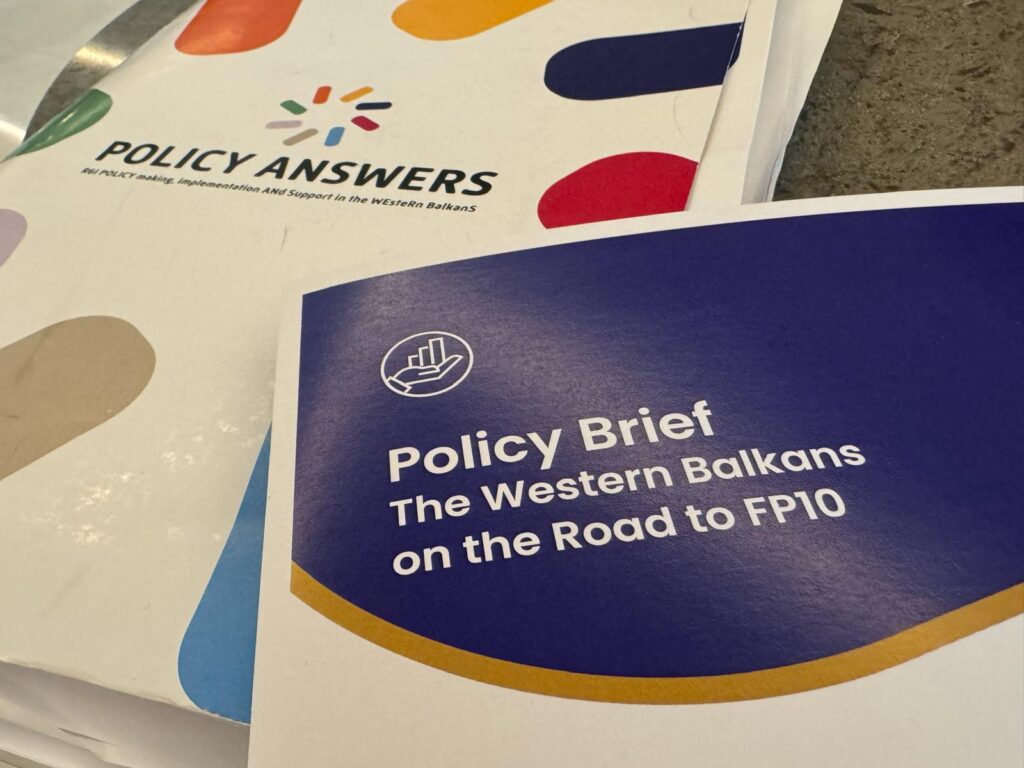
Research and Innovation
Western Balkans ministers emphasized the need for significant investments in skills development and the cultivation of intellectual assets, positioning the new Growth Plan and Reform Agendas as essential tools. EU Commissioner Iliana Ivanova highlighted key initiatives such as the COST programme, which fosters networking opportunities, the new European Charter for Researchers, and the European Innovation Council (EIC) Pathfinder and Accelerator. She also drew attention to regional collaborations, like the COBISS project with Slovenia and the BIOEAST initiative with Hungary.
Keynote speakers and ministers underscored the urgent need to upgrade skills to tackle technological challenges and to provide targeted support for increasing the competitiveness of small and medium-sized enterprises (SMEs). They called for strengthening quadruple or quintuple helix cooperation—bringing together government, academia, industry, civil society, and environmental organizations to drive innovation. Ministers emphasized the importance of creating and nurturing innovation ecosystems that inspire young people to innovate.
As economies in the Western Balkans undergo green and digital transformations in line with European integration efforts, reshaping the research and innovation (R&I) sector is essential. New legal frameworks and strategies, such as Smart Specialisation Strategies, are playing a pivotal role. The European Research Area (ERA) is becoming a reality, with increased participation in Horizon Europe, and a focus on developing research infrastructures and skills.
Various initiatives were discussed, including open access to research infrastructures of the Joint Research Centre, international knowledge and technology transfer, and commercialisation opportunities. There was a strong emphasis on both social and economic innovations. Participants shared experiences from national innovation agencies, funding mechanisms like the CEEPUS scholarship programme, and engagement with diaspora communities. Platforms such as science festivals, start-up support via innovation centres, science and technology parks, and business incubators were also highlighted.
Several economies in the region plan to increase their R&I budgets, with investments earmarked for laboratories, high-performance computing infrastructure, and incentives to encourage private sector spending on R&D. Ministers reiterated the critical role of the younger generation as change agents, underscoring the need to attract and retain talent in the region.
The discussions concluded with mentions of participation in Horizon Missions, the establishment of Regional Innovation Hubs by the EIT, and the pilot regional Innovation Voucher scheme, with a deadline of November 20. Macro-regional strategies, Digital Innovation Hubs, and other instruments were also discussed as crucial to enhancing Europe’s competitiveness and accelerating integration efforts.
On Day 2, the POLICY ANSWERS project was highlighted as a key cooperation platform, alongside initiatives from the Regional Cooperation Council (RCC), such as mapping research infrastructures, providing NCP (National Contact Point) support, offering competitiveness foresight, and delivering technical assistance for technology transfer and Digital Innovation Hubs. North Macedonia’s, Montenegro’s, and Serbia’s innovation funds were also recognised for their innovation grants, flagship programmes, innovation vouchers, and venture capital development. They are actively collaborating with the European Innovation Council, EUREKA, and other stakeholders.
Science and technology parks, incubators, and regional start-up centres were identified as pivotal in transforming the region’s innovation ecosystems. Developing Smart Specialisation Strategies has been a valuable experience in fostering entrepreneurial mindsets. The European Business and Innovation Center Network (EBN) underscored the need for a cultural shift, greater alignment across sectors, and the importance of civil society’s involvement in the innovation landscape. The European Innovation Council Forum and its working groups offer further opportunities for regional actors to continue this exchange of ideas and initiatives.
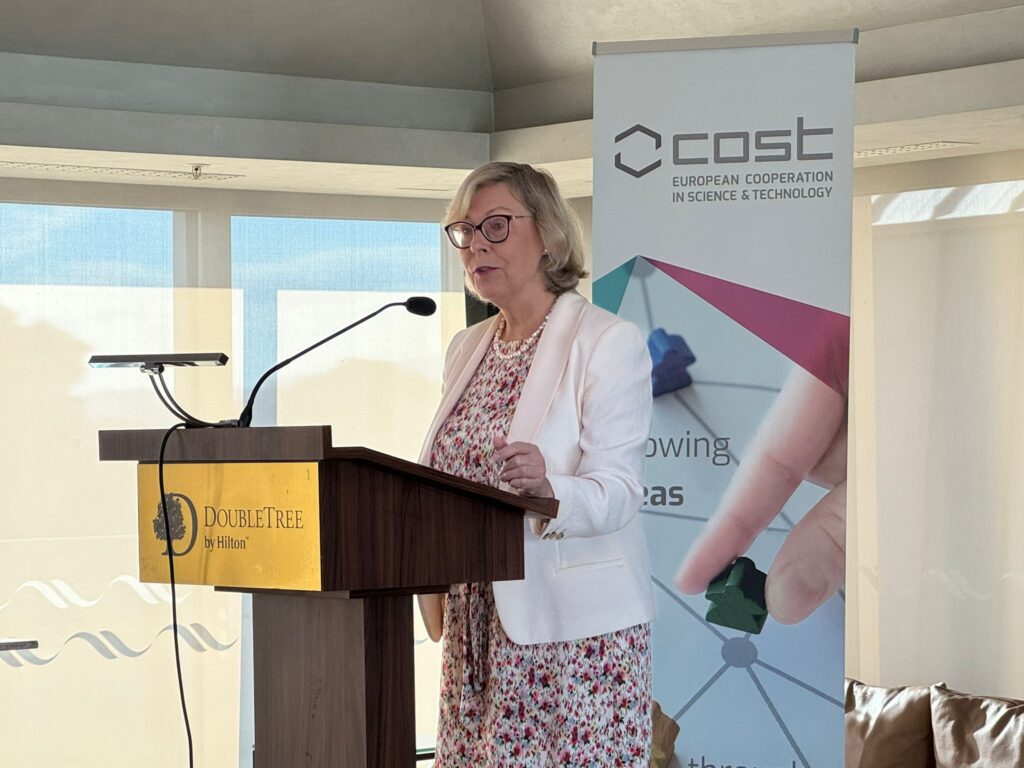
Smart Specialisation (S3)
The European Economic and Social Committee emphasized its pivotal role in promoting EU enlargement, highlighting S3 as a strategic tool to align economies with EU cohesion policies and strengthen institutional readiness for absorbing cohesion funds. The discussion focused on how Smart Specialisation can drive economic development through tailored strategies.
Economies in the region shared their experiences with stakeholder engagement during the Entrepreneurial Discovery Process (EDP) and emphasized the necessary reforms to policy frameworks and administrative capacities to ensure effective governance of S3 strategies and action plans. The importance of clear communication and robust monitoring systems was also stressed. Participants exchanged information on key priorities, underscoring the complexity of the process but agreeing on its benefits for long-term development.
Interministerial cooperation and coordination emerged as crucial for success, with regular working group meetings recommended to ensure all stakeholders’ needs are addressed. Regional collaboration on shared territorial challenges was also highlighted as vital to advancing Smart Specialisation and fostering collective growth in the region.
